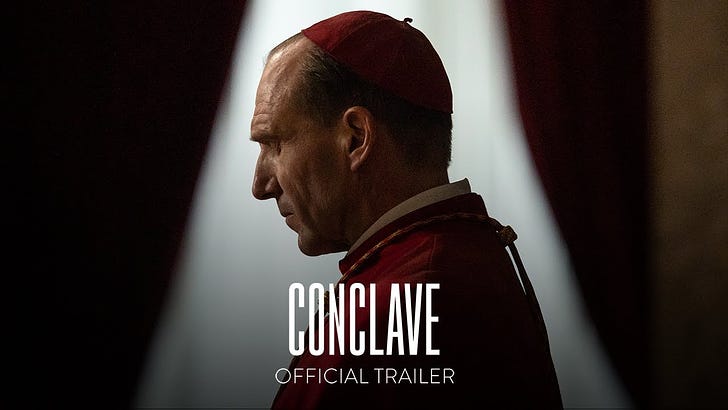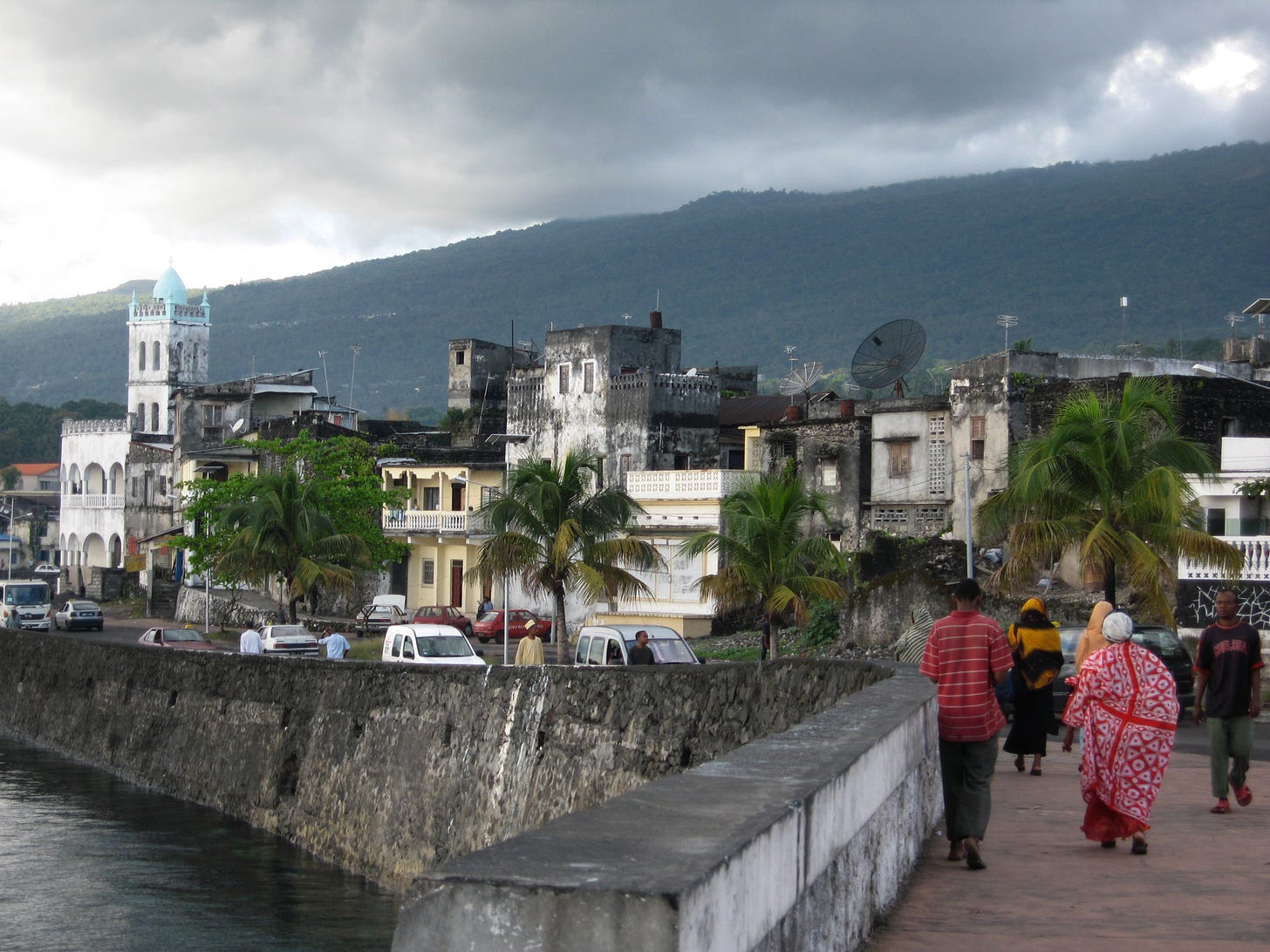🔅 Vatican Politics, John Legend & Witchcraft Engulfs a Nation
Oscar Contenders Meet Concert Controversies
Good Morning from Moroni, Comoros!
The Ahistorical Racial Polemic of Conclave
Award season buzz is swirling around Conclave, the ecclesiastical thriller by Edward Berger that may just waltz home with an Oscar for Best Adapted Screenplay this Sunday.
We watched the movie a few weeks ago, but if you haven’t, you’ve probably heard the hype and how it claims to peel back the gilded curtains of the Vatican’s most secretive process: choosing a new pope. But as cultural critic Otosirieze points out, there’s one big problem—Conclave borrows from real Catholic history and then bends it in ways that land the film on shaky ground, especially when it comes to its singular Black African cardinal.
In the film, the revered hall of the Sistine Chapel brims with mostly European cardinals. Meanwhile, Joshua Cardinal Adeyemi of Nigeria strides in—commanding, yet cautious. He quickly becomes the “crowd favorite” for a moment, at least, igniting (supposedly progressive) chatter that maybe the next pope won’t hail from Europe. But if you’re a fan of real-life papal election stats, you might question whether it’s an alternate timeline. The actual track record is fairly unkind to African candidates—famously, Francis Cardinal Arinze was hyped by the media in the 2005 and 2013 conclaves, only to flounder in the ballot count. According to Otosirieze, Conclave’s “everyone-loves-Adeyemi” scenario soars into pure fantasy territory, but that’s not the real mischief at play.
When Adeyemi emerges as a top contender, you’d think the Church is finally transcending the Eurocentric papal tradition.
But then come the revelations: our African frontrunner hides a long-ago affair with a Nigerian nun that produced a child. In other words, out of thousands of documented clerical abuse cases in Western parishes over the years, the screenplay pins its biggest scandal on the only major African presence in the room. It’s a twist that Otosirieze slams as “ahistorical.” True, it’s drama—Oscar-friendly, perhaps—but it leaves a sour aftertaste once you recall how the Catholic Church’s real-life abuse sagas have mostly erupted in Europe, the US, and Australia.
Therein lies the rub: Conclave hints at a racially enlightened conclave, only to torch the storyline by branding the African cardinal as the figure guilty of prime transgression. Otosirieze suggests this is part of a persistent Hollywood pattern—Black characters often face the biggest moral downfall (or literal downfall) to move the plot along. In a story that revels in pulling back the Vatican’s thick red drapes, this narrative choice feels more like a whitewashing (or blackwashing) of history than the historical unveiling it pretends to be. For Otosirieze, that’s not just an odd creative decision—it’s a stinging reinforcement of stereotypes.
Of course, with the Oscars looming, none of this might derail the film’s shot at golden glory.
Whether Conclave sweeps through award night remains to be seen. But if it does, Otosirieze’s parting shot lingers: be wary of a film that hands us a color-blind fantasy—then uses the lone Black figure as a sacrificial lamb for the Catholic Church’s very Western sins. Sure, the cinematography might be majestic, the performances quietly mesmerizing, and the “Oscar contender” chatter fully justified. Just don’t forget to ask whose stories get sanitized—and whose get sacrificially sensationalized.
John Legend Shows Up in Rwanda, Shrugs Off Criticism Over Congo War
Cue the fireworks and the Twitter meltdown: American singer-songwriter John Legend lit up Kigali’s stage last week and swiftly became a lightning rod for accusations of ignoring Rwanda’s alleged military meddling in the neighboring DR Congo conflict. You’d think a musician who’s publicly sparred with Donald Trump and ditched Kanye West might be all about political posturing—but Legend’s message this time is, “I’m just here to grow touring opportunities in Africa.”
As humanitarian activists clutched their pearls, the 44-year-old EGOT winner doubled down on what amounts to: “Don’t blame ordinary Rwandans if you hate their government’s foreign policy.” Critics found that stance a bit out of tune, considering Rwanda reportedly has 4,000 troops backing the M23 rebels in mineral-rich eastern DR Congo. But others say he has a point.
Tems Bows Out, Legend Stays In
For some African music fans, the biggest shock was that Legend carried on with his Move Afrika concert even after Nigerian star Tems canceled her own Kigali date. (She basically said, “I can’t throw a party when there’s a war next door.”) Legend’s approach? “This show is mission-critical,” he told the BBC, reminding everyone that Africa’s been the dark hole in many so-called “world tours.” Notably, he also mentioned he wasn’t being paid.
In the end, it’s a story of sold-out seats in Kigali, a wave of condemnation from all corners of the internet, and John Legend insisting his presence is about investing in Africa’s cultural scene, not endorsing foreign intervention.
Complicated, isn’t it? Curious to hear what you think?
A Witchcraft Trial In Zambia is About Much More Than Just Spells

It’s not every day you hear about witchcraft making the nightly news, but in Zambia, two men are on trial for allegedly cooking up a supernatural curse against the president.
In December, a hotel cleaner reported unusual sounds from a guest room in Lusaka, leading police to stumble upon an animal tail, a cryptic red cloth, and a chameleon in a bottle. The men were allegedly paid (or so one confessed) more than $1 million to conjure up a lethal curse against President Hakainde Hichilema. They now face charges of practicing witchcraft, possessing charms, and cruelty to animals.
But the fuss also highlights a 1914 Witchcraft Act—handy leftover from when Britain was in charge—that lumps together any “supernatural power” with an intent to injure or scare. Zambia’s modern leaders have long recognized that many Zambians take witchcraft very seriously. A recent study found 79% believe in its existence. Attempts to reform that old law haven’t gained traction, yet plenty of locals (including high-profile figures) quietly admit they do believe in spells and curses.
Not surprising, then, that whenever the topic of black magic comes up, folks lean in. Zambia’s courts, not so much; witchcraft trials rarely make it to the mainstream judicial system, which is why this one has the public glued to its outcome.
There’s political intrigue, too. Opponents have claimed Hichilema orchestrated the trial to score points before next year’s election.
Originally, the judiciary said they’d broadcast the trial live—only the second time that’s ever happened in Zambia—but they reversed course after “stakeholders” objected.
With big questions about whether “expert witch doctors” would appear in court as star witnesses, the case underscores a societal split: fervent belief in mystic powers vs. modern, Western-style rule-of-law. For some Zambians, it’s a sign the legal system has a long way to go in acknowledging local traditions. For others, it’s a golden opportunity to slam the old Witchcraft Act that lumps all traditional healers into the same suspect pot.
No matter how the court’s gavel falls, you can be sure of one thing: the trial has the nation enthralled—proof that in Zambia, the supernatural is anything but old-fashioned folklore. Just ask the chameleon in that bottle.
Food for Thought
“Fire is not extinguished with fire.”
— Kenya Proverb






I would’ve been impressed if the Zambia witches had disappeared or done something remarkable. How can they take such powerful people to ordinary human court? 🙃
As for John Legend, he makes so much sense. I also respect Tems for her decision..
John Legend is a pro at this humanitarian thing and I’d like to believe he knows what he’s doing because he has been consistent. The wailers on social media need to tell us how they’re supporting Rwanda.
Lots of goodies in this one